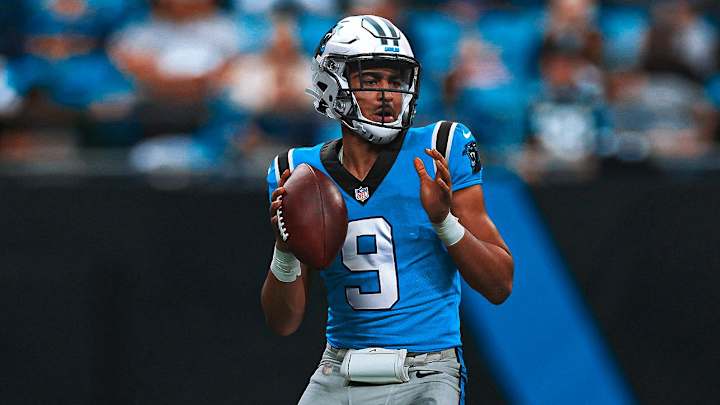Drafting Bryce Young No. 1 Was a Risk That Made Sense for the Panthers

In this story:
The Panthers have now officially drafted Alabama quarterback Bryce Young, a conclusion most people have expected since the team traded up for the No. 1 pick with whatever remaining draft capital they had not already spent trading for various other quarterbacks over the past three seasons.
To some, this may seem like their most defenseless move yet. Dealing the picks required for Sam Darnold, Matt Corral and Baker Mayfield was one thing. Dealing significant capital across three drafts, in addition to a top-tier wide receiver (DJ Moore), for one of the shortest (5'10") and lightest (204 pounds) quarterbacks in modern NFL history is another. One idea—resurrecting a quarterback believed to be better than his track record shows—is easily defensible in league circles. Another idea—taking a player whose only historical comparison would be Drew Brees on keto—is less so. But why?
I’ll go ahead and take what I consider an easy layup here by defending both Young and the Panthers, who are finally taking a more calculated swing at fixing the quarterback position long term. At least, that’s the way I see it. In fact, his selection finally represents a departure from the Panthers’ previous predicament under Matt Rhule and general manager Scott Fitterer, an executive who has had to wear his inability to deliver a passer for the past three seasons, and then watched that failure force a coaching change. That’s precisely why this pick is a good thing.
The Panthers had been involved with chasing quarterbacks who are certifiably elite (with their name surfacing in conversations for Matthew Stafford and Deshaun Watson at various points in recent seasons), but for whatever reason or reasons, they’ve had to settle for projects in the hopes that one of them could overcome or outgrow their most significant defects and maybe approach that level (what’s the category just below elite?). No pun intended, but Young doesn’t have to outgrow anything.
- Follow all the picks with Sports Illustrated’s draft tracker
- SI’s Live Grades For All 31 First-Round Picks
- Fantasy Impact: How Young selection affects your lineup
Out of any quarterback in this year’s class, he has certifiably elite traits that aren’t going to change. He has been this way since kindergarten, as I wrote in my profile of him last week. He almost broke the scale on the S2 cognitive examination, which has had some early hits at predicting on-field success. If he runs into some kind of challenge, based on his body size, chances are, like at every other level he has played, he’ll find some way to figure it out. This we know, or can infer, with a great deal of certainty.
Those of you out there focusing on height, in particular, are ignoring the fact that this is Young’s only theoretical negative as a prospect, and he has spent his entire life overcoming and adapting (a process we have written extensively about, if you’re interested). Other quarterbacks in this draft have to overcome aspects of their game that are harder to iron out, such as consistency, accuracy, mobility and, yes, how a player sees the field and reacts to what defenses are throwing at them. And Young is an outlier only because there is not a large sample size of short quarterbacks. They have been readily dismissed throughout time in favor of taller bodies, and thus people suggesting Young would be an outlier are noting so without acknowledging how thin the pool is because of some relied-upon truism that has diluted the crop.
As an aside, we’re conveniently ignoring that bigger quarterbacks such as Daunte Culpepper (6'4", 260), Ben Roethlisberger (6'5", 241), Andrew Luck (6'4", 240) and Cam Newton (6'5", 245) have all missed significant time due to injury or had their bodies betray them in some way.
Saying short quarterbacks are not successful is a lot like saying mobile quarterbacks were not successful back when Michael Vick was entering the league in 2001. Mobility, and all of its ridiculous attached fears and assumptions, carried with it a false fear that it was somehow not conducive to winning. Now it would be absolutely stunning if most of the quarterbacks in the playoffs could not leave the pocket with regularity when they need to.
We are just now entering a period of acceptance for shorter quarterbacks, which should ultimately inform NFL teams’ decision-making long term. Take Johnny Manziel—whose problems had nothing to do with height (6'0")—out of the equation. What is so bad about Drew Brees, Kyler Murray, Russell Wilson (before age 35), Vick and Doug Flutie?
I won’t blame the Panthers for not wanting to be surprised anymore. With Young, they know exactly what they are getting. And holding on to what you know for sure is elite is better than hoping what you find will become as much. Fitterer and the Panthers know this now. They have learned the lesson. Hence, the beginning of an era with Young as a franchise quarterback.

Conor Orr is a senior writer for Sports Illustrated, where he covers the NFL and cohosts the MMQB Podcast. Orr has been covering the NFL for more than a decade and is a member of the Pro Football Writers of America. His work has been published in The Best American Sports Writing book series and he previously worked for The Newark Star-Ledger and NFL Media. Orr is an avid runner and youth sports coach who lives in New Jersey with his wife, two children and a loving terrier named Ernie.
Follow ConorOrr